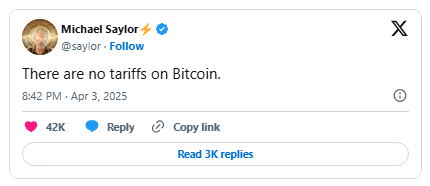ARTICLE AD BOX
Michael Saylor, Executive Chairman of Strategy, pointed out that Bitcoin won’t face tariffs under US President Donald Trump’s new import tax plan. Saylor shared this view on X, telling his 4.2 million followers about Bitcoin’s unique position compared to physical goods.
Digital Assets Dodge Trump’s New Trade Taxes
“There are no tariffs on Bitcoin,” Saylor wrote in his X post. His statement comes as market watchers track how the cryptocurrency market responds to the new tariff increases. According to reports, many investors worried about how Trump’s April 2 “Liberation Day” plans would affect crypto prices. But these concerns haven’t caused major price drops so far.

Asian Countries Face Highest Import Taxes
Based on information from Trump’s announcement, several Asian nations will face steep tariffs on their goods entering the United States. China will see a 34% tax rate, while Japan faces 24%. Taiwan’s imports will be charged at 32%, and Vietnam tops the list with a 46% tariff. These new import taxes will start on April 5, according to the announcement.
The new US Tarrifs
 China — 34%
China — 34%
 European Union — 20%
European Union — 20%
 Vietnam — 46%
Vietnam — 46%
 Taiwan — 32%
Taiwan — 32%
 Japan — 24%
Japan — 24%
 South Korea — 25%
South Korea — 25%
 Thailand — 36%
Thailand — 36%
 Switzerland – 31%
Switzerland – 31%
 Indonesia — 32%
Indonesia — 32%
 Malaysia – 24%
Malaysia – 24%
 Cambodia – 49%
Cambodia – 49%
 UK – 10%
UK – 10%
 South Africa — 30%
South Africa — 30%
 Brazil – 10%
Brazil – 10%
 Bangladesh -34%… pic.twitter.com/W3n22Z0GnI
Bangladesh -34%… pic.twitter.com/W3n22Z0GnI
— Chay Bowes (@BowesChay) April 2, 2025
US Allies Not Spared From New Trade MeasuresThe tariff plan extends beyond economic rivals. Even American allies must pay more to sell their products in the US market. The UK will face a 10% tax on imports, Israel 17%, European Union countries 20%, and India 26%. China has already threatened to respond with its own tariffs if Trump doesn’t reverse his decision. The back-and-forth raises questions about broader economic impacts.
Although Trump’s tariff announcements caused market jitters, Bitcoin prices have remained relatively stable. The cryptocurrency was trading at $83,105 when this article was written, with only a 1% drop over the last 24 hours. Some market analysts opine that physical goods carry the brunt of tariff effects, while digital assets may escape direct effects.
The tariff impasse serves to emphasize Bitcoin’s odd position in global commerce. Unlike oil, gold, or manufactured goods that need to physically traverse borders, Bitcoin transactions occur electronically. This aspect may make cryptocurrencies a winner in trade conflicts since they cannot be halted or taxed at border points.
Several investors are worrying that Bitcoin could still be indirectly affected by increased tariffs. If the costlier imports reduce the income of companies and consumers, they might invest less money into cryptocurrency, which might end up reducing funding to the cryptocurrency market. For now, it’s still above the $80,000 mark while the market watches the tariff development.
Trump labeled his tariff proposal as “reciprocal,” adding that it reflects what other nations are charging on American products. As countries react to these new trade policies, cryptocurrency markets appear less impacted than other commodity markets.
Featured image from Gemini Imagen, chart from TradingView
.png)
 9 hours ago
2
9 hours ago
2








 English (US)
English (US)